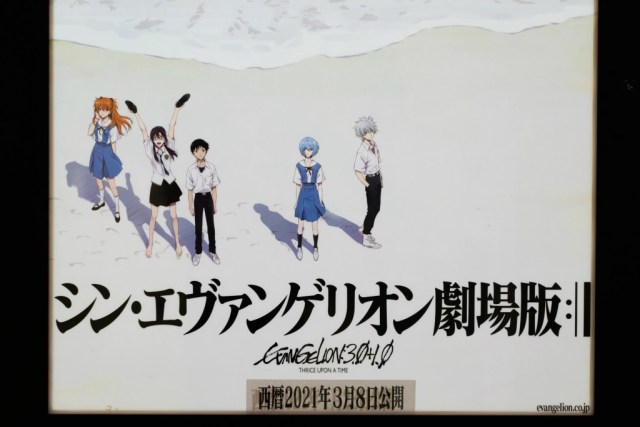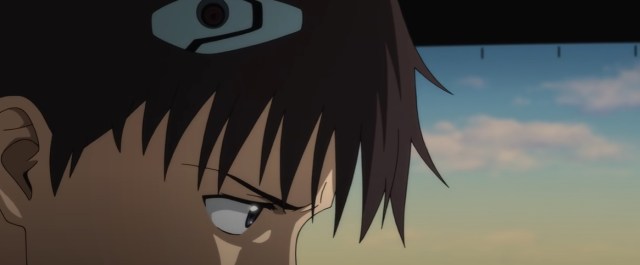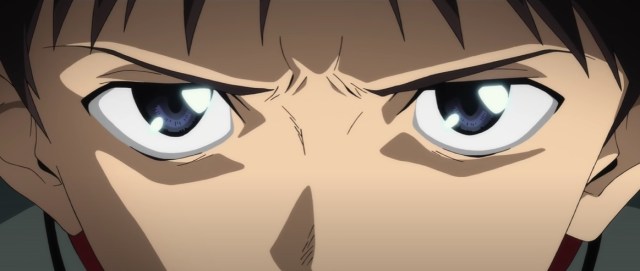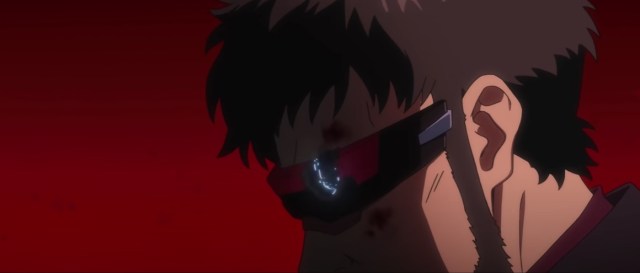
Our Eva fan grew up with a dad like the one Shinji is stuck with, so how does he feel after watching Evangelion: 3.0+1.0 Thrice Upon a Time?
If you’re slotting it into a genre, Evangelion goes in the science fiction/mecha one. It is, after all, a series about giant robots fighting giant alien monsters.
But for all the physical confrontations it resolves through punching, stabbing, and shooting, many fans would argue that it’s the series’ mental conflicts that really make Eva so uniquely compelling. With Evangelion: 3.0+1.0 Thrice Upon a Time releasing this week, our Japanese-language reporter Tasuku Egawa, whose relationship with his own father was similar to the one between Eva protagonist Shinji and his robot-designing dad Gendo, took a moment to reflect on the emotional journey it’s been being an Evangelion fan for more than 20 years, and how the series can affect you in different ways depending on what stage of life you’re in while you’re watching it, so we’ll turn things over to him (minor, non-specific spoilers ahead).
– – – – –
Tasuku: The thing that’s always drawn me to Evangelion is the theme of the parent-child relationship between Gendo and Shinji. Speaking personally, when I was growing up, my own father was very much like Gendo.
I watched the original Evangelion TV series while it was originally airing in the ‘90s on broadcast TV in the evening. At that time, I was in the upper grades of elementary school, and I was completely on Shinji’s side. Even then, I could tell Shinji wasn’t the cool-guy protagonist of other anime series. But what really struck me was how oppressive Gendo was, and how he’d do things seemingly at random just to test Shinji. In that way, I felt he was a lot like my own father.
▼ Trailer for Evangelion: 3.0+1.0 Thrice Upon a Time
I could also identify with how Shinji was more likely to listen to and accept ideas from other people than his father. Sure, it was kind of annoying how Misato would stick her nose in Shinji’s business, but once you got used to that part of her personality, she wasn’t that bad. Fuyutsuki would give Shinji some space, and Kaji would talk to him like an equal.
Because Shinji was the closest in age to me out of all the characters, I could identify with him, and understand how he felt about the adults surrounding him. Even in the ending for the 1997 End of Evangelion movie, I could understand how Shinji’s story could end that way, and I can still understand that now.
But then Rebuild of Evangelion film series started, and when I watched Evangelion: 1.0 You Are (Not) Alone and Evangelion: 2.0 You Can (Not) Advance I was in my mid-20s, and I found myself feeling a little irritated at Shinji. I can sympathize with how difficult it must be for him to have the adults around him making such forceful, unreasonable demands, but I still found myself wishing he’d toughen up, and not be so weak mentally. Meanwhile, I felt like I’d started to better understand the situation the adults in Nerv were in. I was now older than the 14-year-old Shinji, and my perspective had changed.
I guess this is a common thing for people in their 20s. You’re just getting out of your childhood, so you start to be dismissive towards what you see as childish behavior. You yourself haven’t really established enough of your adult identity to accept or condone childishness.
Then when Evangelion: 3.0 You Can (Not) Redo came out in 2012, I was in my late 20s. The two things I remember most about watching it are thinking “Misato, explain to Shinji what’s going on already!” and “Shinji, just calm down for a second!”…Being in my late 20s, I was now far in age from the 14-year-old Shinji and the 40-ish Misato. My way of thinking was probably closest to the 28-year-old Asuka, but I also thought she was a little too quick-tempered.
That brings us to Thrice Upon a Time, which came out on March 8, and I watched as I’m getting close to leaving my 30s behind and entering my 40s. On the 7th, I rewatched You Can (Not) Redo at home, then went to the theater to see Thrice Upon a Time the next morning. This time, I could understand why Asuka had been as angry as she had, and also why Misato choose not to kill Shinji “for the greater good” in You Can (Not) Redo, which had always been something I didn’t quite get about her in that movie.. I can’t get very much into why it made sense to me while watching Thrice Upon a Time without spoilers, but now that I can better understand Misato’s experiences, and how she saw Shinji, I can see that she couldn’t kill him, and she’s always been on his side.
As for Asuka, now I can see that sometimes in your 20s, even if you’re starting to learn what it means to be an adult, and accept your societal responsibilities, you’ve still got a ways to go before you can do those without getting irritated at others and letting them know it. You have a measure of confidence and power to affect changes, but it still usually takes all you’ve got just to take care of yourself, even if you’re not aware of that limitation, and you don’t yet have the experience and perspective you need to fully show compassion for others. So in that sense, I think Asuka is pretty normal for a 28-year-old, and probably even better than a lot of people are at that age, so I can’t just dismiss her actions out of hand.
And finally, we come back to Gendo and Shinji. In End of Evangelion, Gendo lays his feelings out, says “I’m sorry” to Shinji, and dies. Shinjij grows through some fundamental emotional growth, and the story ends with the child understanding the parent a little more.
But in Thrice Upon a Time, the resolution is very different. Different people might have different reactions when seeing it, but for me, I feel that this time Shinji and Gendo, parent and child, both grow as people. The parent helps the child, and the child helps the parent, resulting in a deepening of their mutual understanding. Both of them come to their own internal resolutions, and then they continue on their individual paths.
Even in real life, I think it’s common for children and parents to understand each other better after the children grow up. “I still had so much to learn back then.” “You’ve grown into a fine adult.” Their relationship becomes a cheerful and friendly one.
But there are also people who resolve their differences like how Shinji and Gendo do in Thrice Upon a Time, where the parent and their adult child become independent form one another, and achieving that independence is their resolution. They’re still parent and child, but they’re now able to treat each other calmly, as adults. Phrasing it nicely, they’re now two adults who understand and respect each other, and leave the past in the past. In less rosy terms, even if the relationship isn’t completely devoid of emotion, they’re now two independent individuals.
Neither style of resolution is universally better than the other. But for those people who have grown up having a strained relationship with a parent, the second style, where you become independent individuals, can be in itself a kind of ideal. Becoming a lovey-dovey family, where the parent is all “Oh, sweet child of mine!” and they’re all smiles and laughs, isn’t going to happen. But again, that doesn’t mean that less sentimental resolution is less than ideal
More than anything else, it’s the depiction of that resolution to Shinji and Gendo’s relationship that stuck with me. For someone who grew up having a strained relationship with his own father, it pierced my heart like the Spear of Longinus.
When I was a kid, my dad really was like Gendo. Always strict. Always testing me…Of course I hated being treated like that, and I didn’t like him being around. But now, I can see what he, as an adult, was dealing with a little better, and at the time, I think he probably didn’t really understand my position all that well either.
Thankfully, my dad isn’t quite on Gendo’s level, and as he’s gotten older, he’s mellowed out a lot, and these days he can be pretty laid back even. I’ve also become less irritable and combative than I was when I was a kid. I’m less stubborn, and because of all that, our relationship is much more peaceful these days.
But I don’t think I’ve handled things as well as Shinji does in the end. When I hit my 20s, I thought I’d passed hum up in terms of emotional growth, but watching Thrice Upon a Time, he’s way ahead of me
When I got to the end of You Can (Not) Redo, I had no idea how Evangelion was going to end, but Thrice Upon a Time really is a good ending. When it finished, I was left with a positive feeling from a conclusion that wraps everything up cleanly and convincingly. For someone with a difficult family background like me, there’s just a tiny trace of bitterness in the bittersweetness, but even that makes it all the better, and I’d say it’s the best ending Evangelion could possibly have. It was like looking at a clear sky, rising up from deep inside my heart.
Top image: SoraNews24
Insert images: YouTube/株式会社カラー khara inc.official, SoraNews24
● Want to hear about SoraNews24’s latest articles as soon as they’re published? Follow us on Facebook and Twitter!
[ Read in Japanese ]
Follow Casey on Twitter, where his own dad is closer to Patlabor’s Goto than Gendo.





 Final Evangelion movie gets new release date, new preview, and is coming incredibly soon
Final Evangelion movie gets new release date, new preview, and is coming incredibly soon Fourth and final Evangelion Rebuild movie finally has release date, beautiful new trailer【Video】
Fourth and final Evangelion Rebuild movie finally has release date, beautiful new trailer【Video】 Final Evangelion movie’s runtime leaked, and it’s the series’ longest by far
Final Evangelion movie’s runtime leaked, and it’s the series’ longest by far New trailer for final Evangelion movies is as crazy as it is beautiful【Video】
New trailer for final Evangelion movies is as crazy as it is beautiful【Video】 Final Evangelion movie to stream first 12 minutes for free this weekend【Video】
Final Evangelion movie to stream first 12 minutes for free this weekend【Video】 Survey finds that one in five high schoolers don’t know who music legend Masaharu Fukuyama is
Survey finds that one in five high schoolers don’t know who music legend Masaharu Fukuyama is Highest Starbucks in Japan set to open this spring in the Tokyo sky
Highest Starbucks in Japan set to open this spring in the Tokyo sky Saitama is home to the best strawberries in Japan that you’ve probably never even heard of
Saitama is home to the best strawberries in Japan that you’ve probably never even heard of Starbucks Japan complexly raises prices, will now charge for takeout bags
Starbucks Japan complexly raises prices, will now charge for takeout bags Fives places around Japan to appreciate the plum blossoms this season
Fives places around Japan to appreciate the plum blossoms this season Japanese jeweler launches new engagement and wedding rings with Sanrio character Tuxedo Sam
Japanese jeweler launches new engagement and wedding rings with Sanrio character Tuxedo Sam Naruto and Converse team up for new line of shinobi sneakers[Photos]
Naruto and Converse team up for new line of shinobi sneakers[Photos] New Mochi Cream Doughnuts from Mister Donut pay homage to Japanese confectionery
New Mochi Cream Doughnuts from Mister Donut pay homage to Japanese confectionery Yakuzen ramen restaurant in Tokyo is very different to a yakuza ramen restaurant
Yakuzen ramen restaurant in Tokyo is very different to a yakuza ramen restaurant Mario World: The awesome Nintendo-themed apartment you can rent for your next short stay in Tokyo
Mario World: The awesome Nintendo-themed apartment you can rent for your next short stay in Tokyo The 10 most annoying things foreign tourists do on Japanese trains, according to locals
The 10 most annoying things foreign tourists do on Japanese trains, according to locals Starbucks Japan releases new sakura goods and drinkware for cherry blossom season 2026
Starbucks Japan releases new sakura goods and drinkware for cherry blossom season 2026 Is Sapporio’s Snow Festival awesome enough to be worth visiting even if you hate the snow? [Pics]
Is Sapporio’s Snow Festival awesome enough to be worth visiting even if you hate the snow? [Pics] Japan has trams that say “sorry” while they ride around town…but why?
Japan has trams that say “sorry” while they ride around town…but why? Tokyo Skytree turns pink for the cherry blossom season
Tokyo Skytree turns pink for the cherry blossom season Sakura Totoro is here to get spring started early with adorable pouches and plushies
Sakura Totoro is here to get spring started early with adorable pouches and plushies Poop is in full bloom at the Unko Museums for cherry blossom season
Poop is in full bloom at the Unko Museums for cherry blossom season Shibuya Station’s Hachiko Gate and Yamanote Line stairway locations change next month
Shibuya Station’s Hachiko Gate and Yamanote Line stairway locations change next month Japan’s new “Cunte” contact lenses aren’t pronounced like you’re probably thinking they are
Japan’s new “Cunte” contact lenses aren’t pronounced like you’re probably thinking they are Japan’s newest Shinkansen has no seats…or passengers [Video]
Japan’s newest Shinkansen has no seats…or passengers [Video] Foreigners accounting for over 80 percent of off-course skiers needing rescue in Japan’s Hokkaido
Foreigners accounting for over 80 percent of off-course skiers needing rescue in Japan’s Hokkaido Super-salty pizza sends six kids to the hospital in Japan, linguistics blamed
Super-salty pizza sends six kids to the hospital in Japan, linguistics blamed Starbucks Japan unveils new sakura Frappuccino for cherry blossom season 2026
Starbucks Japan unveils new sakura Frappuccino for cherry blossom season 2026 Foreign tourists in Japan will get free Shinkansen tickets to promote regional tourism
Foreign tourists in Japan will get free Shinkansen tickets to promote regional tourism Take a trip to Japan’s Dododo Land, the most irritating place on Earth
Take a trip to Japan’s Dododo Land, the most irritating place on Earth Is China’s don’t-go-to-Japan warning affecting the lines at a popular Tokyo gyukatsu restaurant?
Is China’s don’t-go-to-Japan warning affecting the lines at a popular Tokyo gyukatsu restaurant? Survey asks foreign tourists what bothered them in Japan, more than half gave same answer
Survey asks foreign tourists what bothered them in Japan, more than half gave same answer Japan’s human washing machines will go on sale to general public, demos to be held in Tokyo
Japan’s human washing machines will go on sale to general public, demos to be held in Tokyo Starbucks Japan releases new drinkware and goods for Valentine’s Day
Starbucks Japan releases new drinkware and goods for Valentine’s Day We deeply regret going into this tunnel on our walk in the mountains of Japan
We deeply regret going into this tunnel on our walk in the mountains of Japan Studio Ghibli releases Kodama forest spirits from Princess Mononoke to light up your home
Studio Ghibli releases Kodama forest spirits from Princess Mononoke to light up your home Major Japanese hotel chain says reservations via overseas booking sites may not be valid
Major Japanese hotel chain says reservations via overseas booking sites may not be valid Put sesame oil in your coffee? Japanese maker says it’s the best way to start your day【Taste test】
Put sesame oil in your coffee? Japanese maker says it’s the best way to start your day【Taste test】 No more using real katana for tourism activities, Japan’s National Police Agency says
No more using real katana for tourism activities, Japan’s National Police Agency says Final Evangelion movie is finally finished, because Hideaki Anno says it is
Final Evangelion movie is finally finished, because Hideaki Anno says it is Final Evangelion movie is finally out, and we’ve seen it! Our Eva fans’ spoiler-free impressions
Final Evangelion movie is finally out, and we’ve seen it! Our Eva fans’ spoiler-free impressions Evangelion creators issue multilingual warning for pirated copies, preview final film’s third act
Evangelion creators issue multilingual warning for pirated copies, preview final film’s third act Utada Hikaru sings, Eva fights Eva in jaw-dropping new trailer for final Evangelion movie【Video】
Utada Hikaru sings, Eva fights Eva in jaw-dropping new trailer for final Evangelion movie【Video】 Final Evangelion movie streams on Amazon Prime in over 240 countries, subbed and dubbed, in August
Final Evangelion movie streams on Amazon Prime in over 240 countries, subbed and dubbed, in August Voice actress warns “idiots” to not take bathroom breaks while streaming final Evangelion film
Voice actress warns “idiots” to not take bathroom breaks while streaming final Evangelion film Evangelion can (not) get released – Final Rebuild film gets delayed again
Evangelion can (not) get released – Final Rebuild film gets delayed again Would Hideaki Anno get in the damn robot if someone told him to? Eva creator holds Q and A
Would Hideaki Anno get in the damn robot if someone told him to? Eva creator holds Q and A Evangelion in 11 languages! Amazon releases multi-lingual preview for final Eva anime film【Video】
Evangelion in 11 languages! Amazon releases multi-lingual preview for final Eva anime film【Video】 Evangelion studio receiving threatening fan comments, will report offenders even outside Japan
Evangelion studio receiving threatening fan comments, will report offenders even outside Japan Beautiful new Evangelion reveals key frame artwork from the anime series’ finale film【Pics】
Beautiful new Evangelion reveals key frame artwork from the anime series’ finale film【Pics】 Chinese Evangelion poster found to contain copied artwork
Chinese Evangelion poster found to contain copied artwork You can turn half your arm into Eva Unit-01 with the crazy Evangelion drink holder
You can turn half your arm into Eva Unit-01 with the crazy Evangelion drink holder Rice-farming Rei figure is here to help recreate one of the most memorable scenes from Evangelion
Rice-farming Rei figure is here to help recreate one of the most memorable scenes from Evangelion Evangelion’s final movie finally is finally coming out on Blu-ray, and it (won’t) be cheap
Evangelion’s final movie finally is finally coming out on Blu-ray, and it (won’t) be cheap